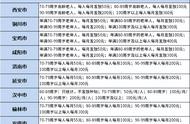1.I don’t mind them. 我不介意它们。
注:mind 此处用作及物动词,意为“介意,反对”,通常用于疑问句、否定句或条件句中,其后可接名词,代词或动词-ing 形式 。mind (sb/one’s) doing sth.表示“介意(某人)做某事”。
2.Because I hope to find out what\' s going on around the world. 因为我希望了解世界各地发生的事。
注:①hope是动词,意为“希望”,常用于两种结构:hope to do sth.和hope that 从句,注意hope后不能直接接人作宾语。②find out 意为“查明,弄清楚”。find out着重表示通过理解、分析、思考、询问等弄清楚一件事情,其后的宾语常常是某个情况、事实。
3. —What do you think of the talk show? 你认为这个谈话节目怎么样?
—I can’t stand it. 我无法忍受。
注:What do you think of一般用来询问对方的看法、意见等。
4. However, he was always ready to try his best. 然而,他总是准备尽最大努力。
注:be ready to do表示“准备好做某事”,动词不定式to do在这里作宾语。
















